Answer the following questions based on the Golfgamez case study above with your recommendations and projections for the businesss expenses. This paper should address the
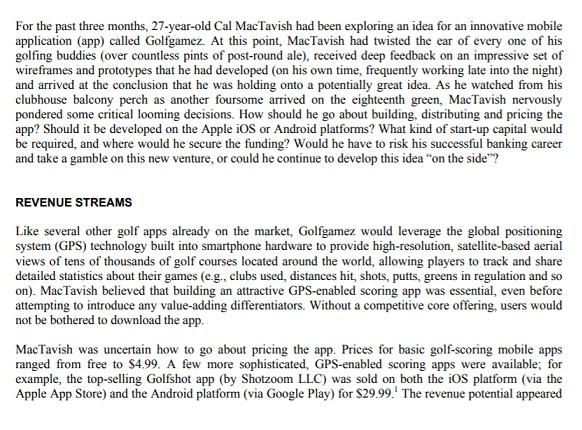
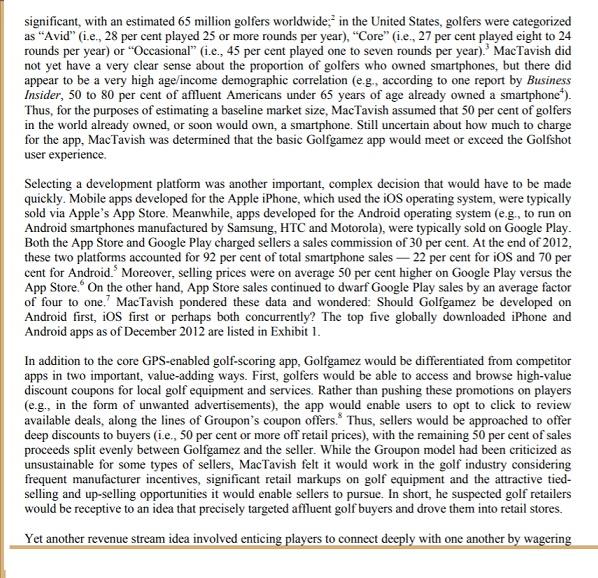
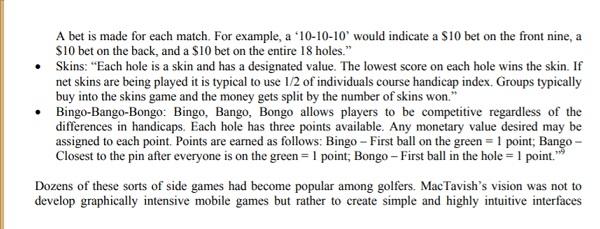
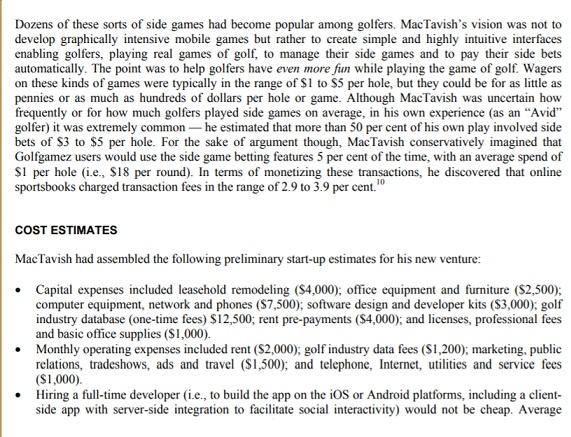

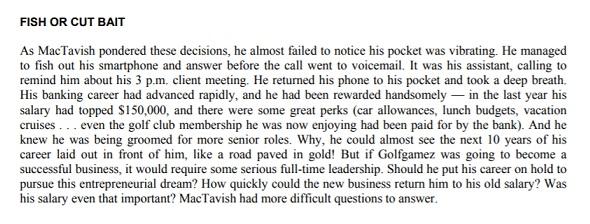
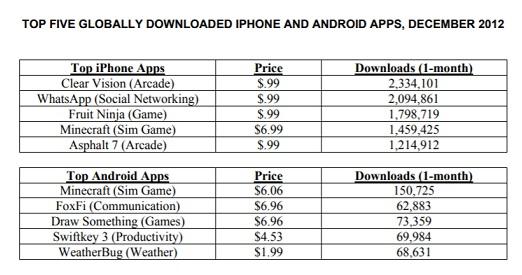
Answer the following questions based on the Golfgamez case study above with your recommendations and projections for the business’s expenses. This paper should address the following:
- Identification and discussion of all startup costs associated with the venture. This should be based on the case and, as needed, any additional research.
- A description of the operating plan/model for the venture, including a discussion of operating costs.
- Articulation of assumptions undergirding the expense model.
- Presentation of the narrative for a best-case scenario, a most-likely scenario, and a worst-case scenario based on adjustments to these assumptions.
For the past three months, 27-year-old Cal MacTavish had been exploring an idea for an innovative mobile application (app) called Golfgamez. At this point, MacTavish had twisted the ear of every one of his golfing buddies (over countless pints of post-round ale), received deep feedback on an impressive set of wireframes and prototypes that he had developed (on his own time, frequently working late into the night) and arrived at the conclusion that he was holding onto a potentially great idea. As he watched from his clubhouse balcony perch as another foursome arrived on the eighteenth green, MacTavish nervously pondered some critical looming decisions. How should he go about building, distributing and pricing the app? Should it be developed on the Apple iOS or Android platforms? What kind of start-up capital would be required, and where would he secure the funding? Would he have to risk his successful banking career and take a gamble on this new venture, or could he continue to develop this idea on the side ? REVENUE STREAMS Like several other golf apps already on the market, Golfgamez would leverage the global positioning system (GPS) technology built into smartphone hardware to provide high-resolution, satellite-based aerial views of tens of thousands of golf courses located around the world, allowing players to track and share detailed statistics about their games (e.g., clubs used, distances hit, shots, putts, greens in regulation and so on). MacTavish believed that building an attractive GPS-enabled scoring app was essential, even before attempting to introduce any value-adding differentiators. Without a competitive core offering, users would not be bothered to download the app. MacTavish was uncertain how to go about pricing the app. Prices for basic golf-scoring mobile apps ranged from free to $4.99. A few more sophisticated, GPS-enabled scoring apps were available; for example, the top-selling Golfshot app (by Shotzoom LLC) was sold on both the iOS platform (via the Apple App Store) and the Android platform (via Google Play) for $29.99. The revenue potential appeared significant, with an estimated 65 million golfers worldwide; in the United States, golfers were categorized as Avid (i.e., 28 per cent played 25 or more rounds per year), Core (i.e., 27 per cent played eight to 24 rounds per year) or Occasional (i.e., 45 per cent played one to seven rounds per year). MacTavish did not yet have a very clear sense about the proportion of golfers who owned smartphones, but there did appear to be a very high age/income demographic correlation (e.g., according to one report by Business Insider, 50 to 80 per cent of affluent Americans under 65 years of age already owned a smartphone*). Thus, for the purposes of estimating a baseline market size, MacTavish assumed that 50 per cent of golfers in the world already owned, or soon would own, a smartphone. Still uncertain about how much to charge for the app, MacTavish was determined that the basic Golfgamez app would meet or exceed the Golfshot user experience. Selecting a development platform was another important, complex decision that would have to be made quickly. Mobile apps developed for the Apple iPhone, which used the iOS operating system, were typically sold via Apple s App Store. Meanwhile, apps developed for the Android operating system (e.g., to run on Android smartphones manufactured by Samsung, HTC and Motorola), were typically sold on Google Play. Both the App Store and Google Play charged sellers a sales commission of 30 per cent. At the end of 2012, these two platforms accounted for 92 per cent of total smartphone sales -22 per cent for iOS and 70 per cent for Android. Moreover, selling prices were on average 50 per cent higher on Google Play versus the App Store. On the other hand, App Store sales continued to dwarf Google Play sales by an average factor of four to one. MacTavish pondered these data and wondered: Should Golfgamez be developed on Android first, iOS first or perhaps both concurrently? The top five globally downloaded iPhone and Android apps as of December 2012 are listed in Exhibit 1. In addition to the core GPS-enabled golf-scoring app, Golfgamez would be differentiated from competitor apps in two important, value-adding ways. First, golfers would be able to access and browse high-value discount coupons for local golf equipment and services. Rather than pushing these promotions on players (e.g., in the form of unwanted advertisements), the app would enable users to opt to click to review available deals, along the lines of Groupon s coupon offers. Thus, sellers would be approached to offer deep discounts to buyers (i.e., 50 per cent or more off retail prices), with the remaining 50 per cent of sales proceeds split evenly between Golfgamez and the seller. While the Groupon model had been criticized as unsustainable for some types of sellers, MacTavish felt it would work in the golf industry considering frequent manufacturer incentives, significant retail markups on golf equipment and the attractive tied- selling and up-selling opportunities it would enable sellers to pursue. In short, he suspected golf retailers would be receptive to an idea that precisely targeted affluent golf buyers and drove them into retail stores. Yet another revenue stream idea involved enticing players to connect deeply with one another by wagering A bet is made for each match. For example, a 10-10-10 would indicate a $10 bet on the front nine, a $10 bet on the back, and a $10 bet on the entire 18 holes. Skins: Each hole is a skin and has a designated value. The lowest score on each hole wins the skin. If net skins are being played it is typical to use 1/2 of individuals course handicap index. Groups typically buy into the skins game and the money gets split by the number of skins won. Bingo-Bango-Bongo: Bingo, Bango, Bongo allows players to be competitive regardless of the differences in handicaps. Each hole has three points available. Any monetary value desired may be assigned to each point. Points are earned as follows: Bingo - First ball on the green = 1 point; Bango- Closest to the pin after everyone is on the green= 1 point; Bongo - First ball in the hole = 1 point. Dozens of these sorts of side games had become popular among golfers. MacTavish s vision was not to develop graphically intensive mobile games but rather to create simple and highly intuitive interfaces Dozens of these sorts of side games had become popular among golfers. MacTavish s vision was not to develop graphically intensive mobile games but rather to create simple and highly intuitive interfaces enabling golfers, playing real games of golf, to manage their side games and to pay their side bets automatically. The point was to help golfers have even more fun while playing the game of golf. Wagers on these kinds of games were typically in the range of $1 to $5 per hole, but they could be for as little as pennies or as much as hundreds of dollars per hole or game. Although MacTavish was uncertain how frequently or for how much golfers played side games on average, in his own experience (as an Avid golfer) it was extremely common - he estimated that more than 50 per cent of his own play involved side bets of $3 to $5 per hole. For the sake of argument though, MacTavish conservatively imagined that Golfgamez users would use the side game betting features 5 per cent of the time, with an average spend of $1 per hole (i.e., $18 per round). In terms of monetizing these transactions, he discovered that online sportsbooks charged transaction fees in the range of 2.9 to 3.9 per cent.0 COST ESTIMATES MacTavish had assembled the following preliminary start-up estimates for his new venture: Capital expenses included leasehold remodeling ($4,000); office equipment and furniture ($2,500); computer equipment, network and phones ($7,500); software design and developer kits ($3,000); golf industry database (one-time fees) $12,500; rent pre-payments ($4,000); and licenses, professional fees and basic office supplies ($1,000). Monthly operating expenses included rent ($2,000); golf industry data fees ($1,200); marketing, public relations, tradeshows, ads and travel ($1,500); and telephone, Internet, utilities and service fees ($1,000). Hiring a full-time developer (i.e., to build the app on the iOS or Android platforms, including a client- side app with server-side integration to facilitate social interactivity) would not be cheap. Average Hiring a full-time developer (i.e., to build the app on the iOS or Android platforms, including a client- side app with server-side integration to facilitate social interactivity) would not be cheap. Average online developer salaries were approximately $91,000 per year, plus benefits of 16.4 per cent, resulting in a monthly salary cost of $8,827. Hiring a full-time marketing manager (i.e., to develop the couponing business) would cost approximately $123,000 per year, plus benefits of 16.4 per cent, resulting in a monthly salary cost of $11,931.2 FISH OR CUT BAIT As MacTavish pondered these decisions, he almost failed to notice his pocket was vibrating. He managed to fish out his smartphone and answer before the call went to voicemail. It was his assistant, calling to remind him about his 3 p.m. client meeting. He returned his phone to his pocket and took a deep breath. His banking career had advanced rapidly, and he had been rewarded handsomely in the last year his salary had topped $150,000, and there were some great perks (car allowances, lunch budgets, vacation cruises... even the golf club membership he was now enjoying had been paid for by the bank). And he knew he was being groomed for more senior roles. Why, he could almost see the next 10 years of his career laid out in front of him, like a road paved in gold! But if Golfgamez was going to become a successful business, it would require some serious full-time leadership. Should he put his career on hold to pursue this entrepreneurial dream? How quickly could the new business return him to his old salary? Was his salary even that important? MacTavish had more difficult questions to answer. TOP FIVE GLOBALLY DOWNLOADED IPHONE AND ANDROID APPS, DECEMBER 2012 Top iPhone Apps Clear Vision (Arcade) WhatsApp (Social Networking) Fruit Ninja (Game) Minecraft (Sim Game) Asphalt 7 (Arcade) Top Android Apps Minecraft (Sim Game) FoxFi (Communication) Draw Something (Games) Swiftkey 3 (Productivity) WeatherBug (Weather) Price $.99 $.99 $.99 $6.99 $.99 Price $6.06 $6.96 $6.96 $4.53 $1.99 Downloads (1-month) 2,334,101 2,094,861 1,798,719 1,459,425 1,214,912 Downloads (1-month) 150,725 62,883 73,359 69,984 68,631
Step by Step Solution
3.35 Rating (155 Votes )
There are 3 Steps involved in it
Step: 1
Answer the following questions based on the Golfgamez case study above with your recommendations and projections for the businesss expenses This paper should address the following Identification and d...
See step-by-step solutions with expert insights and AI powered tools for academic success
Step: 2

Step: 3

Ace Your Homework with AI
Get the answers you need in no time with our AI-driven, step-by-step assistance
Get Started


